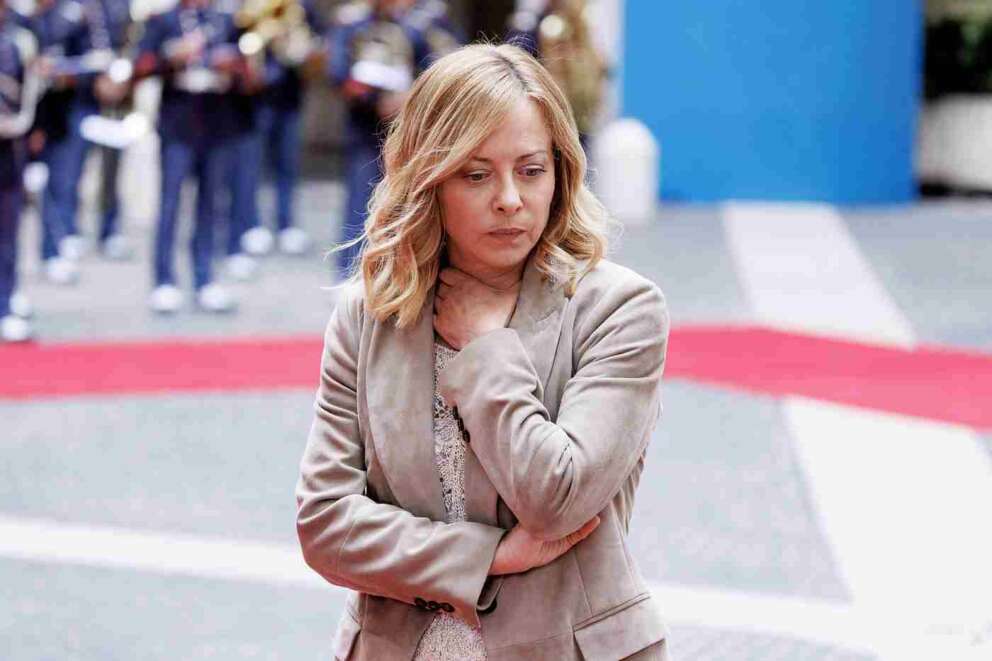Meloni in the trenches, between the Middle East and Ukraine foreign policy is a problem: the prime minister's stammerings

From Gaza to rearmament
On the siege of Gaza, the Italian government is hesitant to move from criticism to outright condemnation. A position that is now weighed down by the attack in Washington, supported by the League. On the Ukrainian front, Meloni's only card is called Leo XIV

There is the problem with Fedriga and the League, far from being resolved despite yesterday's meeting " with the best intentions " between the prime minister and the governor of Friuli. But nothing will move there before the ruling of the Constitutional Court, expected soon. There are the eternal problems of Salvini's Bridge, with the Colle rejecting the anti-mafia exemptions invoked by the minister and deputy prime minister and the huge project confirms for the umpteenth time that it is a huge problem ready to fall on the minister's head. But all this and more is business as usual. Today the games that really matter to Giorgia Meloni , and also the most difficult, are only those related to foreign policy. Or rather, to wars: Ukraine, with rearmament in tow, and Gaza.
Yesterday the most delicate front was the second. The attack in Washington inevitably weighs on positions such as those of Italy. Unlike other large EU countries such as Spain and France and the United Kingdom, Italy is moving with leaden feet. By now the criticisms aimed at Netanyahu are open and continuous and this had never happened in these 19 months. The Prime Minister herself asked Minister Tajani to summon the Israeli ambassador, after the very serious incident in Jenin, the Israeli shots in the air that literally put an international diplomatic delegation to flight, not only to clarify that terrible event but also to weigh the Italian dissent on the continuous bombings and the siege that has reduced the Gazans to starvation.
At the same time, however, the Italian government is hesitant to move from criticism to open and drastic condemnation. Yesterday, the European High Commissioner for Foreign Affairs Kallas announced that she had started the revocation of the trade agreements with Israel after 17 countries voted in favor of the Dutch request for a review. President von der Leyen , who has always been against the revocation, reacted with the utmost coldness, letting it be known that she was "paying attention to the procedure ". Italy, like Germany, Poland and Hungary, voted against the review. The game is far from over and the Italian position has yet to be defined. Foreign Minister Tajani, the most explicit with his Defense colleague Crosetto in openly criticizing the Netanyahu government, yesterday rebalanced the load a bit: " Hamas cannot be the future or the leader of Palestine. It is the cause of the evils that the Palestinians suffer today".
Obviously, the reaction to the attack in Washington, especially supported by the League, the majority force that remains closest to the Israeli government, weighs heavily. To a journalist who asked him if he still considered Netanyahu welcome in Italy, as the member of the League had declared after the arrest warrant issued by the International Court of Justice, the deputy prime minister snarled: " Perhaps you missed the fact that they killed two Jews last night and I was hoping that the extermination of the Jews had ended in the last century" . Interior Minister Piantedosi sounded the red alarm: "At this moment it is particularly challenging to counter anti-Semitic outbursts disguised as criticism of the government of Israel". Overall, for now and despite Europe moving mostly with a completely different rigidity, Italy's position will not change. On rearmament, Salvini reiterated his "Never": " Expenditure on security and the Carabinieri is fine but getting into debt to give money to Germany is absolutely not".
On the Ukrainian front, the card that the Prime Minister wants and can play, perhaps the only one, is called Leo XIV. The hypothesis of a meeting in mid-June at the Vatican between a Russian and a Ukrainian delegation is not unrealistic but still not within reach despite the fact that the Wall Street Journal considers it almost certain and even indicates Secretary of State Rubio as head of the star-spangled delegation, which would arrive in Rome to participate together with the two belligerent countries. Kremlin spokesman Peskov puts the brakes on: " There are no agreements yet. We are working to implement the Istanbul agreements ." The only agreement reached in Istanbul is on the exchange of prisoners, a thousand on each side, but it is preparatory to any future step.
l'Unità





